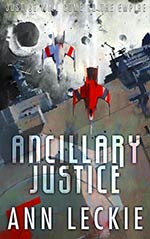
![]() MMOGC
MMOGC
12/3/2013
![]()
There are so many things I want to say about this debut novel by Ann Leckie, but first I just have to express my awe and admiration for some of the themes and concepts in this book. I went into Ancillary Justice after having heard a lot of praise for its originality and imaginative ideas, and now that I've finished it, I can only echo those sentiments.
The book follows Breq, a soldier who is more (and, I suppose, also less) than she seems. An "Ancillary", Breq was formerly one of many corpse soldiers all linked up with an artificial intelligence as part of a massive starship called the Justice of Toren. So in a sense, she is the Justice of Toren. Breq as well as all the other corpse soldier "segments" who were treated as appendages connected to the Justice of Toren werecollectively considered part of the ship. It's a complex but incredibly elaborate concept to wrap my head around, but reading about it made me exultant.
Anyway, after an act of treachery, Breq was the only one who made it out of the subsequent disaster, making her the last surviving remnant of the Justice of Toren, left alone and isolated in a human body. Now she sets herself on a path of vengeance to track down and kill Anaander Mianaai, the multi-bodied and near-immortal Lord of the Radch who was responsible.
As I said, I think the ideas here are very inventive and original, and the way they are executed is also quite clever, if confusing at times. Breq's narration reflects the fact that she is a part of a ship, a bigger whole. In chapters where she is linked up to the rest of the Justice of Toren, we see through the eyes of multiple Ancillaries, which in essence are all one entity. Because the ship's Ancillaries are everywhere, the narrator is aware of things happening around all her different segments who are in different places at the same time. This "omniscient effect" is no doubt a challenge to write, and I think Leckie did as well as anyone possibly could.
There were many times, though, where this book made me feel completely out of my depth. The style of the narration I described above is one reason, but also because of other factors such as Breq's approach to using only the female pronoun to refer to other characters. This gender ambiguity is another point to the innovation and cleverness of this book (and since we humans refer to our ships and other vessels as female, seeing it happen the other way around is so deliciously apropos!) but it also made reading this book a slow and purposeful experience, since I did not want to risk missing anything in the writing.
Added to this is the skipping back and forth in time, as well as the massive amount of information piled upon the reader in the first part of the book. To be fair, lengthy explanations and commentary are probably unavoidable given a book with a premise like this, and a part of me also wonders if Ancillary Justice might be better suited for readers with more experience with science fiction, who'd be better able to adapt to the peculiar pacing. I love this genre, and the details don't get too overly technical here, but I still couldn't help but feel overwhelmed and out of my comfort zone at times.
As such, it wasn't until deep into the later chapters that I finally felt settled into the rhythm of the book. Once the time switches come to an end and the plot moves forward, I found myself a lot more engaged with the story. And indeed, this is a compelling novel, and it raises some interesting questions and themes about freedom, identity, independence and choice.
I think I would have liked this book a lot more if I didn't hit so many speed bumps in the beginning, but working my way through to the end was worth it. The finale was pure action and suspense, and as a character, Breq has certainly made herself memorable. The ideas in this book will stay with me for a long time, and this is overall a great debut.
http://bibliosanctum.blogspot.com/2013/09/book-review-ancillary-justice-by-ann.html